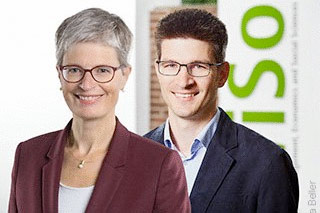In the 2023 review boards election of the German Research Foundation (DFG), 649 places were filled on a total of 49 review boards for the term of office from 2024 to 2028. In total, more than 50,000 out of 150,000 scholars and scientists who are entitled to vote took part in the election and electronically distributed their up to six votes among 1,631 candidates.
Clemens Kroneberg (Institute of Sociology and Social Psychology) and Marita Jacob (also ISS) were elected from the Faculty of Management, Economics and Social Sciences. Further 12 colleagues from the University of Cologne and Cologne University Hospital were also successful: Henrike Haug (Department of Art History), Thomas Grundmann (Department of Philosophy), Clemens Kroneberg (Institute of Sociology and Social Psychology), Marita Jacob (Institute of Sociology and Social Psychology), Andreas Wodarz (Institute of Anatomy I), Matthias Hammerschmidt (Institute for Developmental Biology), Bernd Neumaier (Institute of Radiochemistry and Experimental Molecular Imaging), Thomas Benzing (Department II of Internal Medicine. Divisions of Nephrology, Rheumatology, Diabetes and General Internal Medicine, University Hospital), Björn Schumacher (CECAD Cluster of Excellence for Aging Research and Institute for Genome Stability in Ageing and Disease, University and University Hospital), Roland Goldbrunner (Department of Neurosurgery, University Hospital), Frank Jessen (Clinic and Outpatient Clinic for Psychiatry and Psychotherapy, University Hospital), Carsten Münker (Institute of Geology and Mineralogy), Boris Braun (Institute of Geography) and Sanjay Mathur (Institute of Inorganic Chemistry).
Professor Dr Claus Cursiefen, Vice-Rector for Research of the University of Cologne, said: “I am pleased that members of our university will assume this important role for the DFG in the future. On behalf of the entire Rectorate, I congratulate all elected colleagues.”
After announcing the preliminary results, DFG President Katja Becker thanked all scholars and scientists who made use of their voting rights. “The members of the review boards ensure that DFG funding decisions are made according to academic standards and for the purpose of curiosity, innovation and a thirst for knowledge,” said Becker. “At the same time, the honorary commitment of the members of the review boards is indispensable for the DFG as a funding institution.”
The DFG President currently plans to determine the final election result in February 2024. The newly appointed review boards will then be constituted in their first meetings in the spring of 2024.
Following a three-stage procedure consisting of review, evaluation and decision, the review boards are responsible for the evaluation of funding proposals submitted to the DFG, and thus for the expert quality assurance of the assessment. They compare all proposals in order to identify the most eligible projects within the defined financial conditions. In this way, they ensure that proposals are evaluated according to unified criteria across the DFG's programmes. The elected review board members are assigned to a subject according to the focus of their research activities. A review board is composed of multiple interlinked subject-related research areas and therefore forms an expedient forum for comparative assessment.
